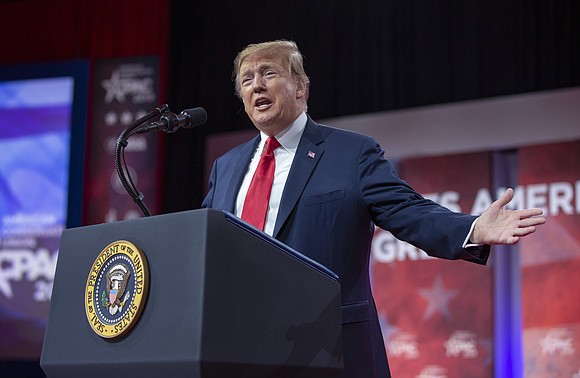Trump says he joked about wanting Russian help in 2016. The facts tell a different story.
CNN/Stylemagazine.com Newswire | 3/5/2019, 9:44 a.m.

By Marshall Cohen, CNN
(CNN) -- President Donald Trump recently claimed he was joking when he asked the Russians to hack Hillary Clinton's emails during the 2016 campaign. But court filings and public comments show some members of Trump's team were quite serious about accepting help from the Russians in 2016.
In the heat of the presidential campaign in July 2016, Trump publicly encouraged Russia to hack Clinton's private server and release her emails. His comments, at a news conference in Miami, have come back to haunt him as he fights the Russian collusion investigation.
He revisited that controversial call Saturday during his wide-ranging speech at the Conservative Political Action Conference, suggesting it was all a joke to rouse an audience.
"If you tell a joke, if you're sarcastic, if you're having fun with the audience, if you're on live television with millions of people and 25,000 people in an arena," Trump said, before re-enacting his 2016 comments. "If you say something like, 'Russia, please, if you can, get us Hillary Clinton's emails. Please, Russia, please. Please get us the emails. Please!' "
Trump has a habit of passing off problematic remarks as jokes. It happened after he said Democrats were "treasonous" for not applauding his 2018 State of the Union address. He did it again after encouraging police officers to be "rough" with suspects, and after challenging then-Secretary of State Rex Tillerson to an IQ test.
Over the past two-plus years, we've learned there were multiple serious efforts by Trump's inner circle to seek political help from the Kremlin or Russian affiliates during the election. The question remains whether Trump knew about or directed any of those efforts.
For starters, look at the June 2016 Trump Tower meeting. Six days before the meeting, Rob Goldstone, a well-connected associate of Trump's, emailed Donald Trump Jr. to say that the Kremlin was actively trying to help his father and was eager to provide the campaign "official documents and information that would incriminate Hillary."
Trump Jr.'s now-infamous response was, "if it's what you say I love it especially later in the summer." He quickly set up the meeting and looped in his brother-in-law Jared Kushner and Trump campaign chairman Paul Manafort. (They all insist nothing came from the rendezvous.)
There's also Roger Stone, the longtime Trump ally and self-avowed "dirty trickster."
Stone wasn't officially working for Trump's campaign in 2016, but he stayed in regular contact with the candidate and maintained a loose network of associates tied to WikiLeaks. In 2016, the website published emails that Russian government hackers had stolen from Democrats.
In January, special counsel Robert Mueller indicted Stone for lying to Congress about his contacts with WikiLeaks. Prosecutors said a senior Trump campaign official had been directed to ask Stone about future WikiLeaks releases after the July 2016 dump of Democratic National Committee emails.
Prosecutors also described how Stone tried to create a back channel with WikiLeaks founder Julian Assange and funneled helpful tidbits back to Trump's orbit. Stone pleaded not guilty.
During that 2016 news conference, Trump questioned whether Russia was behind the hacks and mocked the possibility that he had had anything to do with the WikiLeaks releases, saying, "It is so farfetched. It's so ridiculous. Honestly, I wish I had that power. I'd love to have that power."
Trump may say he was only joking that day, but Mueller noted a striking coincidence of events when he indicted a cadre of Russian hackers.
Following Trump's comments, Russian hackers working "after hours" tried "for the first time" to hack email accounts used by Clinton's "personal office" and the campaign addresses of dozens of Clinton staffers, according to the indictment of 12 hackers from Russia's military intelligence agency known as the GRU.
Later in his July 2016 news conference, NBC News' Katy Tur asked Trump whether it was a problem to ask a foreign country to interfere in the election and hack an opponent's emails.
"I'd like to have them released," Trump said. "No, it gives me no pause ... if Russia or China or any other country has those emails, I mean, to be honest with you, I'd love to see them."
Ten weeks later, WikiLeaks started releasing new tranches of emails damaging to Clinton. They weren't her own private messages, but they were the next best thing: tens of thousands of emails from her campaign chairman and other senior staffers. Clinton still views the steady flow of hacked materials as one of the key reasons for Trump's victory.



